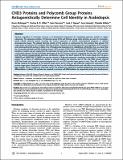Por favor, use este identificador para citar o enlazar a este item:
http://hdl.handle.net/10261/49353COMPARTIR / EXPORTAR:
 SHARE SHARE
 CORE
BASE CORE
BASE
|
|
| Visualizar otros formatos: MARC | Dublin Core | RDF | ORE | MODS | METS | DIDL | DATACITE | |

| Título: | CHD3 Proteins and Polycomb Group Proteins Antagonistically Determine Cell Identity in Arabidopsis |
Autor: | Aichinger, Ernst; Villar, Corina B.R.; Farrona, Sara CSIC ORCID; Reyes, José C. CSIC ORCID ; Hennig, Lars; Köhler, Claudia | Palabras clave: | CHD3 Proteins Polycom group proteins Cells Arabidopsis Pkl PICKLE Eukaryotes |
Fecha de publicación: | 14-ago-2009 | Editor: | Public Library of Science | Citación: | PLoS Genetics 5(8): e1000605 (2009) | Resumen: | Dynamic regulation of chromatin structure is of fundamental importance for modulating genomic activities in higher eukaryotes. The opposing activities of Polycomb group (PcG) and trithorax group (trxG) proteins are part of a chromatin-based cellular memory system ensuring the correct expression of specific transcriptional programs at defined developmental stages. The default silencing activity of PcG proteins is counteracted by trxG proteins that activate PcG target genes and prevent PcG mediated silencing activities. Therefore, the timely expression and regulation of PcG proteins and counteracting trxG proteins is likely to be of fundamental importance for establishing cell identity. Here, we report that the chromodomain/helicase/DNA–binding domain CHD3 proteins PICKLE (PKL) and PICKLE RELATED2 (PKR2) have trxG-like functions in plants and are required for the expression of many genes that are repressed by PcG proteins. The pkl mutant could partly suppress the leaf and flower phenotype of the PcG mutant curly leaf, supporting the idea that CHD3 proteins and PcG proteins antagonistically determine cell identity in plants. The direct targets of PKL in roots include the PcG genes SWINGER and EMBRYONIC FLOWER2 that encode subunits of Polycomb repressive complexes responsible for trimethylating histone H3 at lysine 27 (H3K27me3). Similar to mutants lacking PcG proteins, lack of PKL and PKR2 caused reduced H3K27me3 levels and, therefore, increased expression of a set of PcG protein target genes in roots. Thus, PKL and PKR2 are directly required for activation of PcG protein target genes and in roots are also indirectly required for repression of PcG protein target genes. Reduced PcG protein activity can lead to cell de-differentiation and callus-like tissue formation in pkl pkr2 mutants. Thus, in contrast to mammals, where PcG proteins are required to maintain pluripotency and to prevent cell differentiation, in plants PcG proteins are required to promote cell differentiation by suppressing embryonic development. | Descripción: | 12 páginas, 7 figuras. | Versión del editor: | http://dx.doi.org/10.1371/journal.pgen.1000605 | URI: | http://hdl.handle.net/10261/49353 | DOI: | 10.1371/journal.pgen.1000605 | ISSN: | 1553-7390 | E-ISSN: | 1553-7404 |
| Aparece en las colecciones: | (CABIMER) Artículos |
Ficheros en este ítem:
| Fichero | Descripción | Tamaño | Formato | |
|---|---|---|---|---|
| Arabidopsis_2008.pdf | 774,63 kB | Adobe PDF |  Visualizar/Abrir |
CORE Recommender
PubMed Central
Citations
64
checked on 15-abr-2024
SCOPUSTM
Citations
143
checked on 15-abr-2024
WEB OF SCIENCETM
Citations
139
checked on 29-feb-2024
Page view(s)
363
checked on 19-abr-2024
Download(s)
281
checked on 19-abr-2024
Google ScholarTM
Check
Altmetric
Altmetric
Artículos relacionados:
NOTA: Los ítems de Digital.CSIC están protegidos por copyright, con todos los derechos reservados, a menos que se indique lo contrario.
